|
– Part 1: The Films –
I've lost count of the illnesses, injuries and personal tragedies that have delayed the completion of my reviews over the years. Maybe I'm just unlucky. I detailed current maladies in a recent blog post, but with Universal Noir #1 I had even less excuse than usual, the discs having been sent out in good time and the release delayed for almost a month. Great, I thought, plenty of time to get this one done. That was before I crashed my bike, developed shingles on the left side of my face, and then got hit with postherpetic neuralgia when the shingles receded, an excruciatingly painful condition that messes with my eyesight and makes it hard to concentrate for more than a few minutes at a time. But the review is finally done. At last. Over a week late, but it's complete. Hallelujah.
After five volumes of film noir titles from Columbia Studios, Indicator has here launched its first set of films made under the Universal Studios banner, and as the title of the set is Universal Noir #1, I think we can be reasonably certain that at least one more such collection is on the way. As ever, all six included films are of considerable interest, but just how noir they each are is a subject for debate, one that carries over from my own comments into the special features. All six films are accompanied by commentary tracks, and a small collection of intriguing archive short films, one of which I genuinely believe rivals the features in the sheer quality its filmmaking and storytelling.
As I once again got a little a little carried away with each title, the resulting lengthy review has been split over two pages, with the films covered on page 1 and the technical specs and special feature on page 2. And so, to the films.
Attorney Bob Regan (Edmond O'Brien) doesn't mess around. Fed up with wealthy businessman Andrew Colby (Vincent Price) ignoring his letters, he barges past his attractive private secretary Noel Faraday (Ella Raines), and busts into a meeting to deliver a summons on behalf of his client, Emilio Canepa (Tito Vuolo), whose cartload of bananas was damaged by Colby's negligent driving. Amused though he and his colleagues are by this display, Colby is so impressed with Bob's determination and loyalty to his client that he invites him to his house that evening, where he offers to pay him $5,000 to act as his bodyguard for a few days. He reveals that a former business associate named Leopold Kroner (Fritz Leiber) has just been released from jail after serving five years for stealing a million dollars' worth of bonds from the company, and fears that the man might hold a grudge against him. He reasons that hiring Bob as an attorney would avoid the sort of unwanted publicity that involving the police or hiring professional protection might attract. The cash-strapped Bob eventually accepts, and after securing all the doors the following evening, starts clumsily attempting to ingratiate himself with Noel, which sharply interrupted when a gunshot rings out from upstairs. Bob rushes up to Colby's office, where he sees Colby wrestling with Kroner, who is armed with a pistol that he points in Bob's direction. Bob responds by shooting first, killing Colby in an instant, which the District Attorney (Wilton Graff) subsequently rules as self-defence.
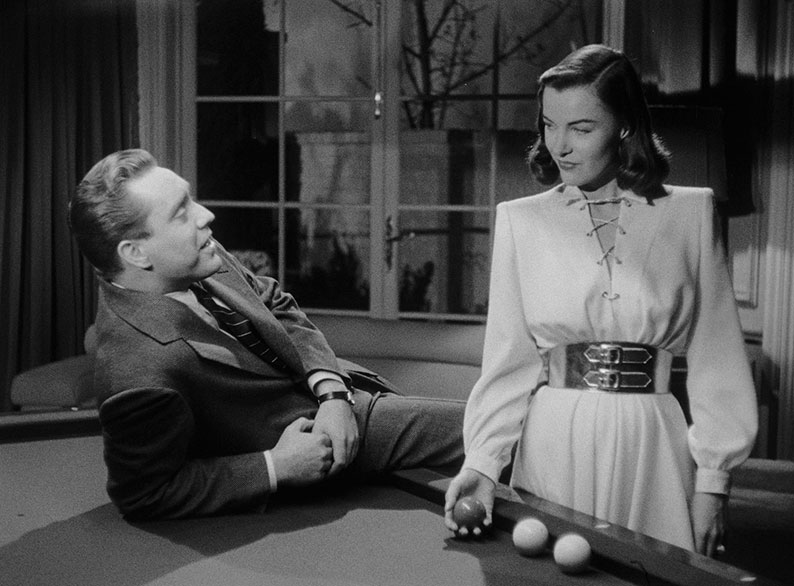
Of course, it's not quite that simple. For a start, we're only 20 minutes into an 87 minute film, so there's clearly going to be more to the story than this. Then there's police Lieutenant Damico (William Bendix), an old friend of Bob's father who seems willing to begrudgingly do Bob the occasional favour – he expedites the required permit for the gun loaned to him by Colby for his bodyguard duties – but is not convinced that everything about the shooting was kosher. It's hard not to share his suspicions just a little. In the opening scene, before Bob blusters his way into Colby's office, we see Kroner exit New York's Grand Central Station, where he is met by his daughter Martha (Maria Palmer) whilst being secretly observed by a man who turns out to be Colby's loyal assistant, Charles Murdock (John Abbott). Here Kroner expresses surprise that Colby was not also here to meet him and expresses his intention to call him, but this elderly and rather frail-looking man is hardly the stuff of 40s crime movie murderers. Damico certainly puts a doubt or two in Bob's mind, which prompts Bob to casually probe the unflappable Colby by relating what he claims is a theory postulated entirely by a cop who reads too many detective novels. In a heavily weighted parting exchange, Bob reflects on losing a game of poker to Colby with the line, "There must be some way of beating you," to which Colby responds with an amused smile, "Not while I hold all the cards."
If Bob is starting to have his own reservations by this point, they're upped considerably when he arrives home that evening to find Kroner's daughter Martha inside his apartment and pointing a pistol in his direction, her intention being to look him in the eye and hear him confess to murdering her father for money before shooting him. Bob knocks the gun from her hand and tries his best to convince her that he shot her father in self-defence, but she's having none of it, and when Bob questions why her father would break into the house, Martha reveals that he was only there at all because he was invited by Colby. For Bob, this proves to be a wake-up call, one that transforms this small-time attorney into a private investigator. Determined to uncover the truth, he digs into the background of the Kroner case, in the process trying but failing to convince Damico to trust him enough for the two to work together, and intermittently sabotaging his developing relationship with Noel by probing her for information that he can use to force Colby's hand.
It's hard to make a case for The Web as a fully-fledged film noir. For me, it's a crime thriller dressed in noir clothing, one that embraces some elements of the subgenre whilst dispensing with others. As a protagonist, Bob certainly fits the bill, being duped into killing a man in what is ostensibly an act of self-defence but increasingly looks set to convict him of murder. The more he digs up, the more trouble he seems to make for himself, and it soon becomes clear that he is pitted against a man who is considerably smarter and more confident of his position than him. Initially, Noel looks to have all the qualifications of a first-class femme fatale. She has the look, the natural cool and the sex appeal of early career Lauren Bacall, and her initial loyalty to Colby and their easy friendship – not to mention that she also lives in his house – makes it unsure just how close their relationship is, or what her true intentions towards Bob might be. But it quickly becomes clear that her attraction to him is genuine (the speed for which she falls for him is genuinely record-breaking) and that she's unlikely to suddenly double-cross him as a result. Also cutting him more breaks than the usual noir lawman is Lieutenant Damico, who despite repeatedly assuring Bob that he'll arrest him for murder when he gets the necessary proof, seems to treat chasing down that evidence as a job that can safely be shelved for another day.
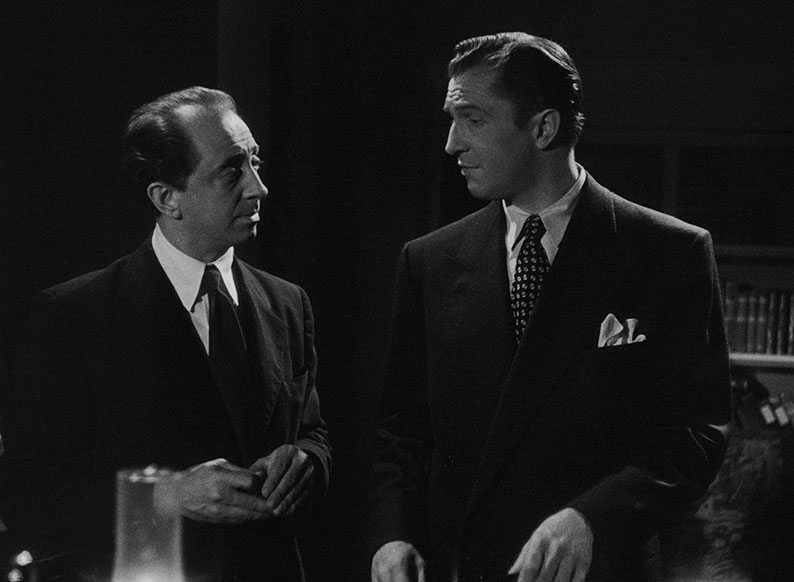
Easily the most fascinating character here is the duplicitous Colby, a heartless and avaricious criminal mind hiding behind a smiling façade of caring respectability. Vincent Price really is sublime casting here, his silky-smooth delivery and disarmingly friendly countenance underscored by a sly malevolence and coldness that at one point prompts even his most loyal employee to question whether he might be disposed of on a whim. Whenever he's on screen, Price quietly dominates the film, but Edmond O'Brien makes for a solidly convincing protagonist and Ella Raines brings real class and allure to the role of Noel Faraday. William Bendix makes for a typically convincing no-nonsense Lieutenant Damico, and there's something about John Abbott's glum unhappiness as Charles that makes him a figure of sympathy even when he's doing his nefarious master's bidding. Even the bit parts have been cast with care here, notably Robin Raymond as a chirpy newspaper clerk, ably demonstrating how to make a character register in just 43 seconds of screen time.
Director Michael Gordon, who later scored a sizeable hit with the Doris Day/Rock Hudson romantic comedy smash Pillow Talk (1959), does a solid job here with occasional stylish flourishes, the best of which (a murderous gunshot that is lost in the thunder of a workman's lorry dumping its load) is aided by the work of prolific editor Russell Schoengarth. It's smartly written by Bertram Millhauser and William Bowers (a name you'll be seeing again in this set), but the film ultimately belongs to the performers, all of whom are on excellent form. An involving and consistently entertaining work, The Web is a welcome rediscovery and a bit of must for fans of 40s crime thrillers, though I suspect the debate will continue over whether it ticks all the boxes required for full noir classification.
Dan Duryea is an actor I so readily associate with villainous roles that seeing him walk into the office of businessman Walter Vanderline (Nicholas Joy) as straight-up and honest-looking investment broker Silky Randall, all friendly smiles and warm handshakes, actually gave me a bit of a start. A good one, I have to say, as it's always enjoyable to watch an actor playing against type, though it doesn't take long for this illusion to be shattered. After being shown the latest plans and noting that all of the investors seem to be friends of his, Vanderline presents Silky with evidence of photographic deception on his part and realises that he's being conned. When he announces that he is going to contact the police, however, Silky and his slick-looking cohort Rick Maxon (John Payne) make it clear that if he does so, they'll take him down with them. They then cheerfully pack up their stuff and depart.
With any film noir, I'm always on the lookout for what will be the architect of the main character's demise, and in the 1948 Larceny, she turns up in the very next scene when Silky and Rick regroup with their fellow confidence tricksters Duke (Dan O'Herlihy) and Max (Richard Rober), and Silky tells his sassy girlfriend Tory (Shelley Winters) to go catch a movie so the boys can talk business. After outlining the plan, Silky informs Rick that he's sending Tory to Havana, and it becomes clear that he suspects Rick and his girlfriend of having an affair, and that he has no intention of letting her go. If that wasn't cause enough for concern, when Rick returns to the hotel room he shares with Duke, Tory is waiting there for him. It's here that the danger she represents to Rick is outlined in bold colours, as her possessive jealousy sees her put her relationship with him above all other considerations, including the potentially lucrative con the gang is about to pull. She's clearly being established here as a narrative hand grenade that is designed to explode in Rick's face sooner or later.
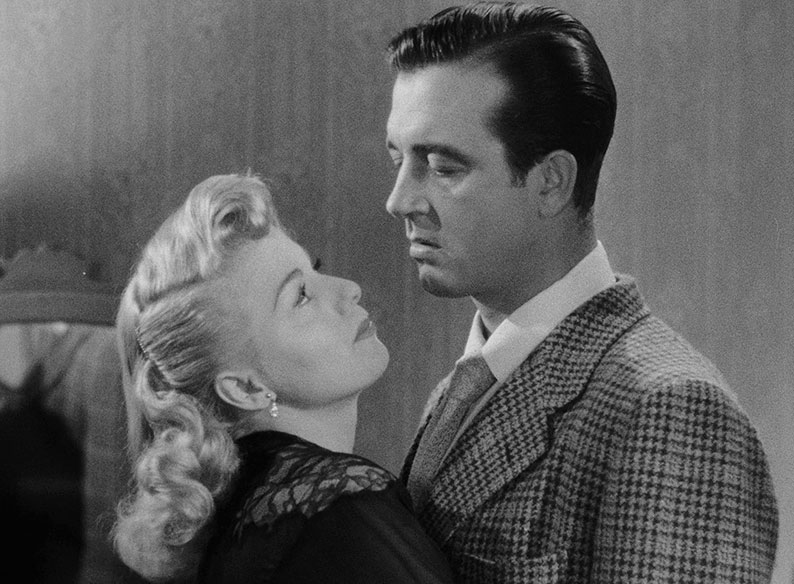
There's just one thing. Frustrating though Tory's actions are, I had no sympathy whatsoever for Rick at this stage. I've never liked conmen, and having watched the country in which I live taken over and fleeced by a whole army of the awful bastards, my hatred of them has only intensified over the years. What's interesting here is that we're clearly not intended to like any of the gang at this stage, and just in case you're having doubts on that score, the nature of the next con should seal the deal. It involves the handsome Rick travelling to the small town of Mission City under the pretence of being a buddy of fallen war hero Jim Clark, then wooing the man's still-grieving widow Deborah (Joan Caulfield), conning her wealthy father and the local townspeople into funding a memorial to Jim's memory, and then scarpering with the investment money.
While painting this quartet of scumbags in such unlikeable colours is certainly a bold and interesting move, it does mean that for a sizeable portion of its running time, the film lacks a sympathetic protagonist. Things change little on this front when Rick arrives at a hotel run by the Mission Youth Athletic Association, whose absent-minded proprietor Charlie Jordan (Percy Helton) is too easily taken in by his storytelling. This does lead to a scene that for me had a layer of meaning that may or may not have been intended, as Rick gives into Charlie's friendly badgering and delivers a speech to the Association's teen members after sitting uncomfortably while they belt out a rendition of Onward Christian Soldiers. As he stands before them and spins an inspiration yarn drawn from wartime experiences he never had, it struck me that Rick and Charlie were both effectively deceiving these kids with very different made-up stories. Won't someone please think of the children?
In a handy bit of timing, Deborah walks in at the tail end of Rick's speech, which offers him the opportunity to make first contact with her. Having impressed her with his inspirational words, Rick starts work on befriending her and planting the idea for a memorial to Jim in her head. All seems to be going to plan for a while, but the potential for a weighty spanner to be thrown into the works arrives in the shape of Tory, who has given Max the slip at the airport and rented a cabin just outside of town in order to be close to a man whose angry protests she has no interest in hearing.
The story of a grifter who takes in the naively innocent folk of an American small town was not exactly new, but the hard edge given to it here by director George Sherman and screenwriters Herbert Margolis, Louis Morheim and our old friend William Bowers, give it the feel of a full-blown noir from its opening scene, despite the absence of some of the genre's key codes and conventions. This does mean that there is a certain inevitability to certain plot developments (hop ahead a paragraph if you're new to noir cinema). We all know that Rick will become emotionally involved with Deborah and that she will become similarly attracted to him, and that it will happen at the sort of speed that only occurs in movies. It's also stamped onto the film in burning capital letters that Tory's obsession with Rick will ultimately screw up the con and Rick's relationship with Deborah. Let's not get started on what will happen when the dangerously jealous Slick inevitably confirms his suspicions about Tory and Rick.
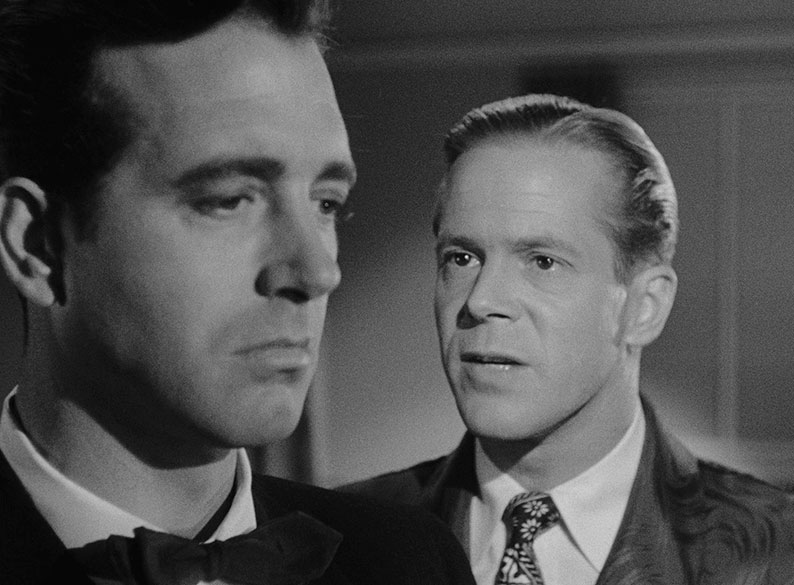
Predictable, then? Well, to a degree, yes, but not in a manner that seriously impacts the unfolding narrative. This is the Hitchcock theory of tension in practice, the bomb under the table that the audience is aware of, allowing the filmmakers to build tension from the uncertainty over when it will explode. As Rick's hardened con-man persona is softened by his exposure to Deborah's hopeful innocence and affection for him, his path to possible redemption becomes peppered with potentially disastrous pitfalls, as Silky and Max show up in Mission looking for Tory and start eyeing Rick's every move, and Tory herself starts making unexpected and potentially risky trips to town to all too visibly attract Rick's attention. Rick, meanwhile, prefigures the James Bond of movies to come by proving to be an instant figure of desire for every young woman he meets. Crucially, this is always woven into the plot, with the attentions of diner waitress (Patricia Alphin) used to publicly kick Tory's possessiveness into high gear, and glamourous secretary Madeline (a nicely flirtatious turn from Dorothy Hart) becoming so bewitched by him that he is easily able to enlist her help to revitalise the grift when it hits an unexpected bump.
As a title, Larceny doesn't mess with ambiguity, and when the final act gets underway it fully justifies its noir classification. Rick's redemption arc is hit by a string of serious stumbles, the brightly lit office in which Rick first banters with Madeline becomes shrouded in ominous shadow as she is charmed into assisting with the scam, and Tory really justifies her role as the film's initially nominal femme fatale. Rick's not the most likeable of protagonists, in part because of his dedication to his nefarious profession, but also because has the countenance of a man who's never had a happy moment in his life. His awakening comes late, but in the end it's enough to get us on his side, particularly when faced with the double threat of the possessively destructive Tory and the jealous and potentially ruthless Silky. The performances are all on-point, though Shelley Winters and Dan Duryea tend to overshadow the wide-eyed innocence of Joan Caulfield and moody John Payne. But if you're looking for an early definition of what constitutes a cinematic antihero, Rick is absolutely your man.
| KISS THE BLOOD OFF MY HANDS (1948) |
|
One thing I never expect to see when sitting down to watch a 1940s American film noir – particularly one with an uncompromising title like Kiss the Blood Off My Hands – is an opening title sequence that unfolds over shots of Westminster and the Embankment in London, but that's what we get here. Following a title card that talks of the psychological damage done by war to the men who fight in them, the camera drifts over and into a small but busy London pub, just as the Landlord (Campbell Copelin) is calling time. As the patrons start dutifully filing out, a man named Bill Saunders (Burt Lancaster) remains sullenly rooted to the bar. When he reacts aggressively to having a hand placed on his arm, the Landlord attempts to eject him and Bill lashes out, knocking the Landlord to the floor, where his head makes fatal contact with the wooden foot of a piano. "Chum, you've been and gone and done it," local man Harry Carter (Robert Newton) tells Bill after checking the fallen Landlord. "He's dead. You've killed him." The barmaid screams, Bill runs for it, and a chase ensues in which he struggles to stay one step ahead of the police.
Finally, he climbs from a hiding place on building site scaffolding through the window of a boarding house room opposite, and even before the film reveals its occupant, I just knew it had to be an attractive young woman. Such is the curse of retrospective genre convention. Woken by the sound of the window being closed, she gets up to investigate and is grabbed from behind and silenced by a hand across her mouth by Bill, who warns her to keep quiet and she won't get hurt. He then wedges an armchair against the door, into which he plonks himself for the night. "Nothing to be scared of," he tells the woman, who replies pointedly, "Then why are you scared?" The woman's name is Jane Wharton (Joan Fontaine), and the following morning when Bill awakes, she's already dressing for work. When she moves to step outside and get the milk for her morning tea, Bill initially blocks her way, but ultimately moves the armchair and lets her through. Surprisingly, she collects the milk and returns to the room. When she heads off to her job at a local medical clinic, Bill tells her a modified story about what happened ("a fight started, somebody got slugged and I ducked out"), and that he intends to stay in the room until it gets dark. "You're a good kid," he tells her as she leaves. When night falls, Bill makes good on his promise and departs, but immediately robs a well-to-do gent of his wallet, using the money he finds within to buy new clothes and rent a room of his own. But he can't seem to get Jane out of his mind.
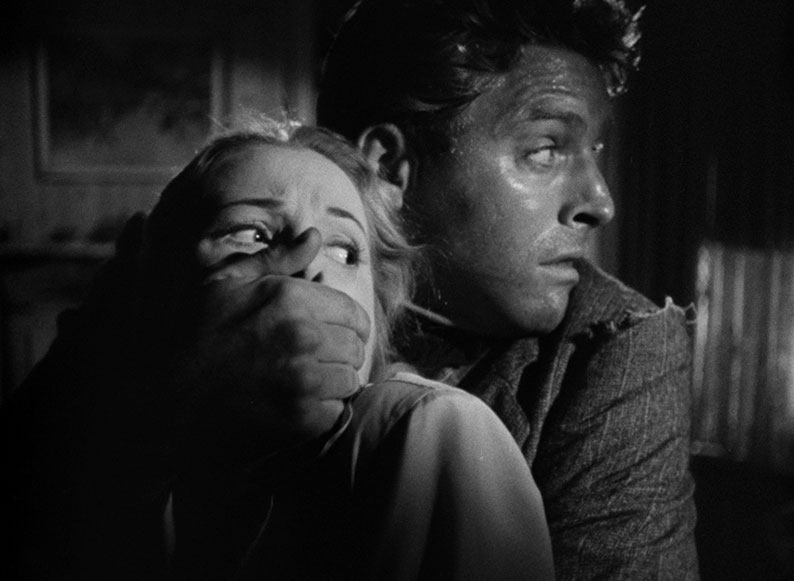
There are a couple of things about these opening scenes that need discussing before we move on. The first is that I can't readily recall another film from Production Code era America in which the lead character kills an innocent man less than a minute into the film, seemingly sealing his fate even before his story has really begun. The second is that the chase across this impressive Hollywood backlot version of London is superbly staged and filmed, making for what may be the best opening scene of any film in this set. When it comes to Bill and Jane, however, I had some issues. A man fleeing the police for murder breaks into the room of a young woman, roughly manhandles her and threatens her life, and the next morning she heads off to work and just shrugs it off? It doesn't end there. A couple of nights later, Bill is standing outside Jane's boarding house staring longingly at her window, and the next day approaches her as she's leaving work and continues to pester her until she stops pushing him away and somehow gets to like him. These are not the actions of a romantic lead but a potentially dangerous stalker. But in Hollywood crime movies of this era, couples get together for a variety of implausible reasons and usually at an unlikely speed. The suggestion here is that both Bill and Jane are effectively lonely lost souls and that they recognise this quality in each other. Bit of luck Bill went through the window he did then. It's when he follows Jane into a zoo that things come to a head, as his almost subconscious mimicry of a gorilla's facial movements brings a smile to Jane's face, then the sight and especially sound (full marks to the sound recording and mixing here) of multiple animals losing their shit sends Bill into a cold sweat of panic. As he walks rapidly away with the enquiring Jane at his side, he admits to hating seeing anything caged up, the result on spending two years behind barbed wire in a Nazi prisoner-of-war camp.
Although there had already been films that confronted the effects of what would later be known as post-traumatic stress disorder – including William Wyler's The Best Years of Our Lives (1946) and Anthony Kimmins' Mine Own Executioner (1947) – it was still relatively virgin territory so soon after the end of WWII, and today is more readily associated with films focussed on veterans of the Vietnam War. Kiss the Blood of My Hands takes a big chance by showing the fatal effects of Bill's post-war trauma some time before revealing its cause. In this respect, Jane quickly becomes a figure of potential rehabilitation, befriending him and even securing him a regular job as a lorry driver after another uncontrolled outburst results in him spending six months of hard labour jail time for robbery and assaulting a policeman. It's a job that Bill quickly settles into and enjoys, not least because he's working for the institute that runs the clinic in which Jane still works. It's a positive move that seems to offer him a way to come to terms with his past, but always hovering in the background is the dark cloud of the man he killed in the opening scene. Making sure Bill remembers it is Harry Carter, a sleazy opportunist who repeatedly pops up with attempts to push Bill into aiding him in his criminal enterprises, something he initially resists until the threat of facing the hangman for murder is dangled directly in his face.
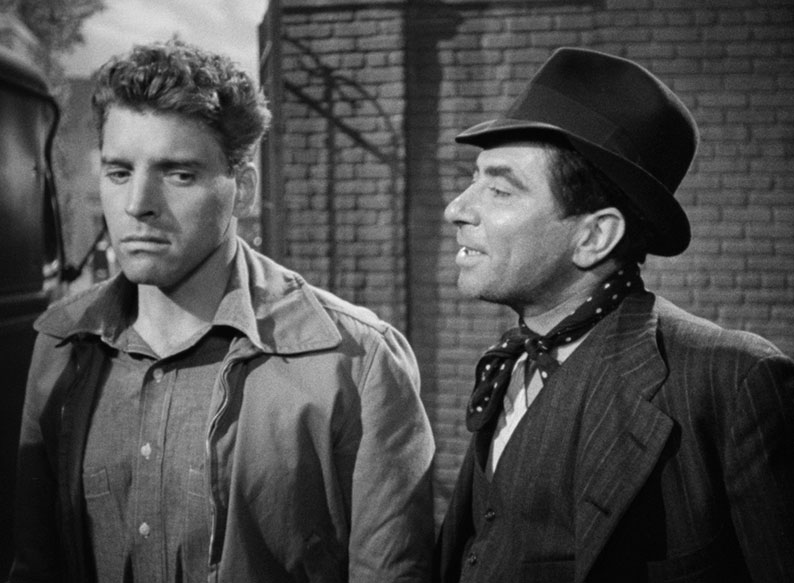
Of all the films in the this collection, Kiss the Blood Off My Hands is the most deserving of the coveted noir label, something evident from an early stage not just in the actions and fate of its antihero, but the expressionistic pools of light and deep shadows of Russell Metty's consistently gorgeous monochrome cinematography. The performances of the leads are crucial here, with Burt Lancaster bringing humanity to a role that in the wrong hands could have been rendered irreversibly villainous, and Joan Fontaine convincing enough in her sympathy for Bill and eventual attraction to him to ease us past the morally problematic nature of their first encounter. An economically developed story, adapted from Gerald Butler's novel by Ben Maddow and Walter Bernstein (with additional dialogue by Hugh Gray), is tightly directed by Norman Foster, and the bond he and Lancaster build between the audience and the theoretically doomed Bill proved strong enough to have me gritting my teeth every time the unrelentingly persistent Harry puts in another appearance. The most significant of these I can't discuss without getting into serious spoiler territory, but it involves a threatening close-up dolly shot worthy of early David Lean, for whom Newton was at his villainous best, of course, as Bill Sykes in Oliver Twist the very same year.
If I threw up a major spoiler warning, I could spend a whole paragraph discussing the ending and what would likely happen next, but I'll leave that for those of you planning to watch the film for the first time to make your own minds about. I will, however give a quick mention to a couple of sequences that caught me by surprise, one because of its relevance to the modern-day anti-vax mob, the other because it taught me a bit of British history. In the first, an obstinate father (Tom Dillon) refuses to allow his seriously ill young daughter to receive the penicillin shot that will likely save her life because he believes the medicine was responsible for the death of his other daughter, who died of diphtheria. His belligerence comes close to triggering a violent response from Bill, who then demonstrates how far he has come by targeting his anger in a more positive way. The other sequence had me initially questioning this Hollywood movie's knowledge of British laws of the day, when Bill is sentenced not just to six months' hard labour, but 18 strokes with a cat-o'-nine tails. Convinced that this was not a sanctioned punishment in British prisons in the 1940s, I did a bit of research and discovered to my surprise – and mild horror – that it was still being employed in UK prisons right into the 1950s. Few will likely be comforted to learn that from 1951 the only whips used for administering such punishment had to be supplied from a stock held at Wandsworth prison in South London, where they were all thoroughly 'tested' before being issued. The things you learn.
As a young woman named Paula Considine (Gale Storm) walks into the Los Angeles missing person's office at City Hall to report the disappearance of her sister Mary, she is watched by a figure in the shadows. As she contemplates the complexities of the form she is asked to fill in, she is approached by cocky reporter Mark Sitko (Dennis O'Keefe), who only seems to take an interest in her case at all because he thinks she looks fine. Men really are pigs at times. As Paula departs, Mark continues to buzz around her like a hungry and unwelcome bluebottle, then suddenly grabs her arm and starts physically leading her down a flight of stairs against her will. She protests, but it becomes clear that he's doing this because they are being followed, and Mark wants to dodge out view in order to confront the man tailing them as his passes. When the man in question appears, Mike grabs him and relieves him of his gun, instantly recognising him as cheapjack private eye Kerric (Raymond Burr).
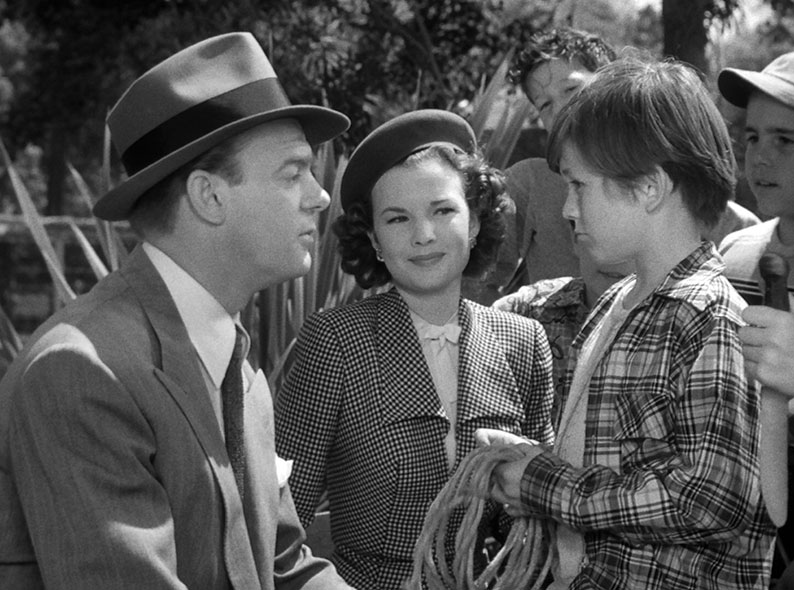
It turns out that Kerric was hired by Paula's father to find Mary and was following Paula in the hope that she would lead him to her. On the advice of the Missing Persons clerk, the three then head to the coroner's office, and quickly discover that Mary's body was found on a building site in a stolen car whose motor was still running, a death that the coroner has ruled as suicide by carbon monoxide poisoning. Mike accepts the verdict but Paula refuses to believe that her sister would take her own life. But there's more. Mary had recently given birth, and the last time Paula heard from her was when she wrote to her from the hospital in which she had the baby, a hospital whose staff claim to have no knowledge of her. And there's also the question of the baby, the location of which at this point is a mystery.
Answers are forthcoming with surprising speed. Just as I was wondering how even a half-assed private eye like Kerric could have failed to already have checked the morgue when looking for a missing person, a look crosses his face that strongly indicates he already knew that she was dead and that it was ruled a suicide. A short while later, he pays a visit to a no-nonsense woman named Dottie Jensen (Meg Randall), and in the conversation that follows it becomes evident that they convinced the unmarried Mary to give up her baby, which they then sold to an eager and wealthy buyer. When Mary then changed her mind and wanted her child returned, they killed her and made it look like suicide. This early reveal in some ways aligns the film with the later TV detective series Columbo, which kicked against the whodunnit formula of detective shows and movies by revealing the identity of the murderer up front, the enjoyment for the audience coming not from trying to solve the mystery, but watching the smarter-than-he-looks detective continuously needle the prime suspect into making a crucial mistake. Here, screenwriter Irwin Gielgud (with additional dialogue by our old friend William Bowers) and director Joseph M. Newman not only reveal what's going on to the audience at an early stage, they also make it clear that the perpetrators are willing to commit murder to protect their presumably lucrative baby selling racket. This does mean that we know more than Mark and Paul about what they are getting into, adding a layer of tension and risk to what otherwise might seem relatively straightforward encounters or enquiries.
As Kim Newman and Barry Forshaw note early on in their commentary track, Abandoned is more a 'ripped from the headlines' crime thriller than a noir movie, but once again it has enough noir elements in its later stages to justify its inclusion in this set. It certainly includes some touchy subject matter for its day, and while it unsurprisingly doesn't get into specifics, the implications are usually clear. Of course, to a modern audience the very idea that a woman might be so ashamed of having a child outside of marriage that she would rather give it away than admit the truth to others might seem a stretch, but such was once the twisted morality of this supposedly Christian society, and one forced on films of the day by the Production Code.
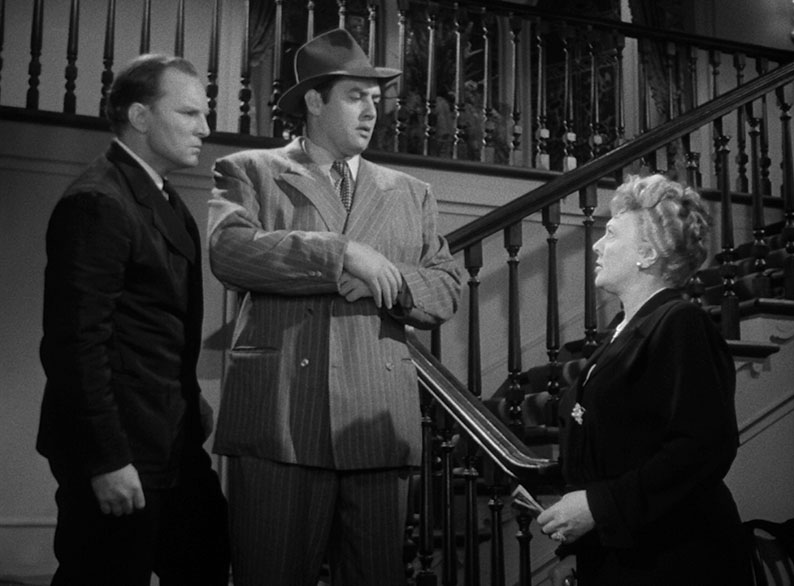
Putting aside the fact that Mark is a bit of a dick who initially seems to treat women with the sort of casual regard that probably results in the very unwanted pregnancies that he ends up investigating, Abandoned is another well-crafted crime drama whose moments where plausibility and even logic falters are generally compensated for by the tension created by the situations it puts the principal characters into. Unsurprisingly for a film of its day, the Salvation Army is presented as a saintly organisation run by the most charitable people on the planet, but when it comes to the characters and performances, the old maxim of the bad guys being more interesting than the heroes definitely applies here. As matriarchal baby seller Dottie Jensen, Meg Randall makes for an impressively smart and cool-headed villain, Raymond Burr brings a nice air of self-doubt to the role of fixer Kerric, and adding a convincing air of menace to the proceedings is Will Kuluva as a gangster named Little Guy DeCola and Mike Mazurki as his seriously intimidating hired goon, Hoppe. It's they who provide the film with its most darkly noir sequence, where an uncooperative captive is worked over and then subjected to a torture we never see but are treated to the unpleasant aural consequences of.
If you ignore the title of the film in which he is the central character, you could initially mistake American Vic Smith (Jeff Chandler) for a tourist or international businessman. As he stands on the deck of a ship while it slides into port of the Italian city of Naples, he seems amused by the sight of local kids scrabbling below for anything the crew might throw their way. Vic tosses a dollar, which floats on the water, into which several of the kids immediately dive in pursuit of these foreign riches. This image of Vic as an easy-going sightseer doesn't last long, as he informs the ship's captain that he can't wait to get off this rust-bucket, then cops an attitude with a hugely tolerant Italian immigration officer, mouthing off to him in a way that would likely land you a full body cavity search today. It emerges here that Vic's birth name is Vittorio Mario Sparducci, that he was born in Italy and left for America in the early 1920s, and when he steps outside he's immediately met by American Embassy representative Wickruff and Italian Interior Ministry carabinieri Vito Bucelli (Claude Dauphin). Bucelli informs him that as a deported citizen he is required to spend the next 30 days in Marbella, the small town in which he was born. Once again, Vic demonstrates a disdain for authority that suggests he's a bit too used to getting his own way.
Although no specifics are provided, by this point enough conversational clues have been dropped for us to start building a backstory for our boy. We know that he made his money in bookmaking, slot machines and the numbers game – shifty professions all – and that his older brother Luigi died in what was likely unpleasant circumstances on Valentine's Day in Chicago. No prizes for decoding that one. Even before confirmation arrives, it's clear that Vic was heavily involved in organised crime in New York, for which he was eventually arrested and did time, and having completed his sentence he has now been deported to the country of his birth.
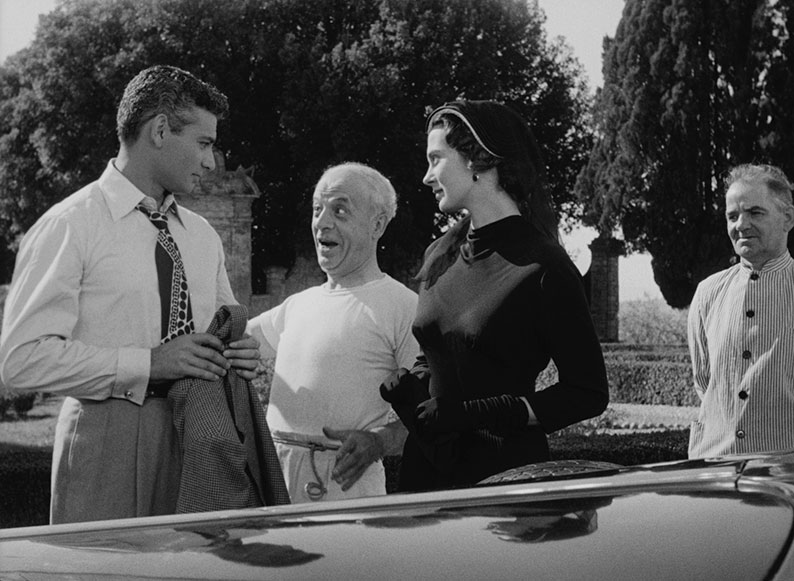
Ordered by Bucelli to catch the next train, the still grumpy Vic flags a taxi, but as he opens the passenger door, a glamorous local woman named Gina Carapia (Marina Berti) does likewise. Vic offers to share the cab and drop Gina at her destination, and on the way convinces her to invite him to her apartment, where the two start snogging as soon as they get through the door. Now I was fully expecting Vic to meet and befriend a local girl who would ultimately prove a force for the likely mellowing of his character, but even by the standards of Hollywood movies of the day, this seemed insanely fast work. As it happens, this proves to be a setup for a nicely done 'gotcha' moment, when it turns out that Gina is actually the girlfriend of Bernardo 'Bernie' Gervaso (Richard Rober), Vic's former partner in the robbery for which Vic did five years in prison. Although Bernie escaped jail time, he's nonetheless keen to get his hands on the $100,000 spoils from the robbery that the authorities never recovered. It's clear that Vic knows where it is, but he's in no mood to share, and when Bernie tells Vic in no uncertain terms that he intends to beat the information out of him, Vic turns the tables and gives Bernie a pasting, then departs with the warning that he never wants to see him again.
When Vic reaches Marbella, he's met by his uncle Armando (Silvio Minciotti) and his wife Theresa (Mimi Aguglia), and driven to the family home. As an American in impoverished post-war rural Italy, Vic quickly becomes the centre of attention for the whole town, none of whom are aware of his criminal past and are under the impression he works with the United States government. But the person who interests Vic the most is the young Contessa Christine di Lorenzi (Märta Torén), who is still in mourning for the loss of her late husband, who died in the tail end of the war five years previously. Christine is a committed philanthropist who has used her wealth to help the people of the town, many of whom would have long ago starved without her assistance. Vic wastes no time ingratiating himself with her and even seems to be interested in helping with her efforts to buy food supplies for the district. But he has also made the acquaintance of Guido Caruso (Carlo Rizzo), a local bar owner and opportunist who knows a little more about Vic's background than his fellow citizens, and who seems keen to team up with Vic in whatever criminal enterprise he cares to propose.
As is pointed out multiple times in the special features, Vic Smith – aka Vittorio Mario Sparducci – is loosely based on real-world figure of Charles 'Lucky' Luciano. An Italian born gangster who made his name in the American underworld, Luciano was eventually convicted for running a prostitution racket, and after spending several years in prison was deported to Italy, arriving in Naples in February 1946, just four years before this film went into production. While this would likely have caught the public attention on its release, all these years later the film's principal interest lies in its on-location filming in Naples, and its curious blend of two very different cinematic styles. Director Robert Siodmak, who as the man behind genre gems like The Killers (1946), The Dark Mirror (1946) and Cry of the City (1948) was no stranger to noir, seems here uncertain whether he wants to make a noir-infused crime drama or a more naturalistic work in the mode of Italian neorealist cinema. In a sense, the main story plays out as the former against a background shaped by the latter. This does give the film the sort of authentic sense of place that you just can't recreate on a Hollywood backlot, and also gives Siodmak access to locally based performers and extras instead of peppering the supporting cast with American character actors with dodgy Italian accents.
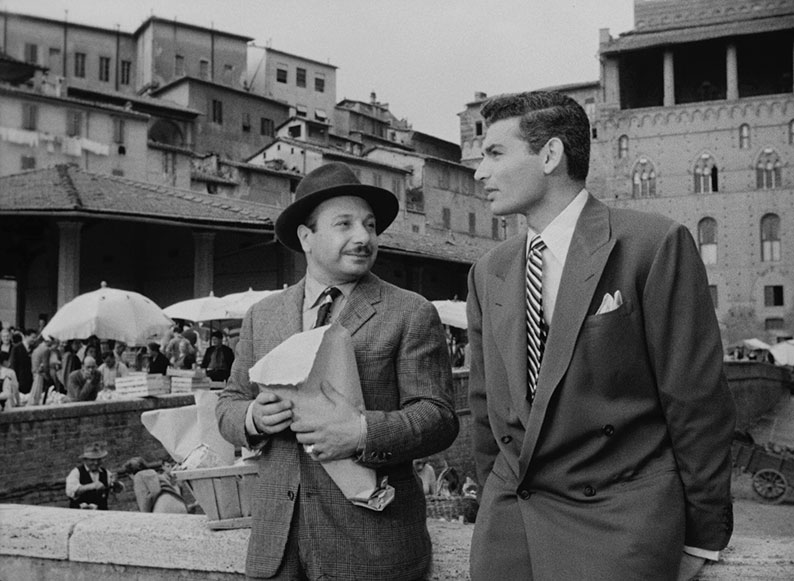
I have to admit that of the six films in this set, Deported was the one that I engaged with the least. There's no denying that the location work is something special for a Hollywood film of this vintage, and being able to call on so many locals to act as extras gives some crowd scenes a sense of scale that would have been too expensive to stage back home. The problem for me is that Vic is such a self-centred grump that he's hard to engage with, even when he seems to be genuinely softening in the widow di Lorenzi's company, particularly as the suspicion remains that he's only romancing her at all as part of a scheme to get the spoils from his robbery into the country. It's easy to get on his side when he's tricked by Gina or threatened by Bernie, but while the plot makes some worthwhile points about poverty in post-war Italy, it doesn't exert quite the hold it should have had, in part because the immorality of Vic's scheme makes it one that we can't help wanting to see fail. That said, I can still see me going back to the film, for its fine location work, for William H. Daniels' impressive cinematography, and for the always engaging and likable Italian supporting cast.
In an unspecified Californian city, local baker Al Willis (Gene Barry) has been brought in on a drunk and disorderly charge and is being interrogated by detective Fred Parks (Casey Adams) and two of his associates. The interrogation has clearly been going on for some time and Willis is getting increasingly agitated, but the detectives are trying their best to keep him calm. When he stands up and announces that he is leaving, Parks puts a restraining hand on his shoulder, and Willis responds by breaking an ashtray over his head. The other two detectives immediately jump in, and despite landing a couple of good blows, Willis is beaten into semiconscious submission. It's during this fracas that Chief Joseph E. Conroy walks in, and it probably says something about the way his department operates that he doesn't bat an eye or pass comment on what is unfolding before him. As two of the detectives restrain the furious Willis, he angrily warns them that nobody socks him around like that, and that he always gets even. Conroy motions for Parks to join him outside, where the detective explains that they were questioning Willis about a recent spate of robberies, but when it's then confirmed that Willis is who he claims to be, that he has a good reputation locally and has never been in trouble with the police, Parks orders that he be let go. On his way out, the considerably more subdued Willis humbly apologises to Parks for his behaviour.
That evening, Willis returns home to his wife Helen (Marcia Henderson) and young daughter, both of whom he is clearly devoted to, before heading back to the bakery to check all is well there. Meanwhile, Detective Parks grabs a coffee at his favourite diner and heads over the road to make a call from the police box, only to be gunned down by an unseen assailant. Conroy and Captain Owen Kincaide (Chuck Connors) are in the process of investigating a string of possible suspects when Conroy remembers Willis's earlier threat and orders Kincaide to bring him in. When approached by Kincaide while attending the wedding of a friend, Willis claims that he will be beaten if he goes downtown with him and makes a run for it, but is quickly apprehended, all the while proclaiming his innocence of the crime. At the station, an aggressive Conroy leans heavily on Willis, who reacts with a mixture of bemusement and fear. This is all brought to a halt by the arrival of Helen and Willis' attorney Gerald Frazier (Paul Levitt), who assures Conroy that he has the wrong man and that he can produce the witnesses to prove it. When Conroy is unmoved, Frazier puts a call in to Police Commissioner F.J. O'Day (Fay Roope), who has already been contacted by influential councilman Edgar Goodwin after receiving a call of complaint from Helen. He asks what tangible proof Conroy has that Willis killed Parks, and all Conroy has is his own conviction that the man is a killer. "He did it!" he barks. "I saw his face when he made that vow." Unsurprisingly, this is not enough to hold Willis any longer and Conroy is ordered to set him free. But Conroy is not about to let this go, and when things escalate, he is removed from his position as Chief of Detectives. He thus teams up with private detective Matt Matthews (Don Haggerty) to make a visible show of watching Willis's every move in the hope of forcing him to do something that will give Conroy the evidence he needs to convict.
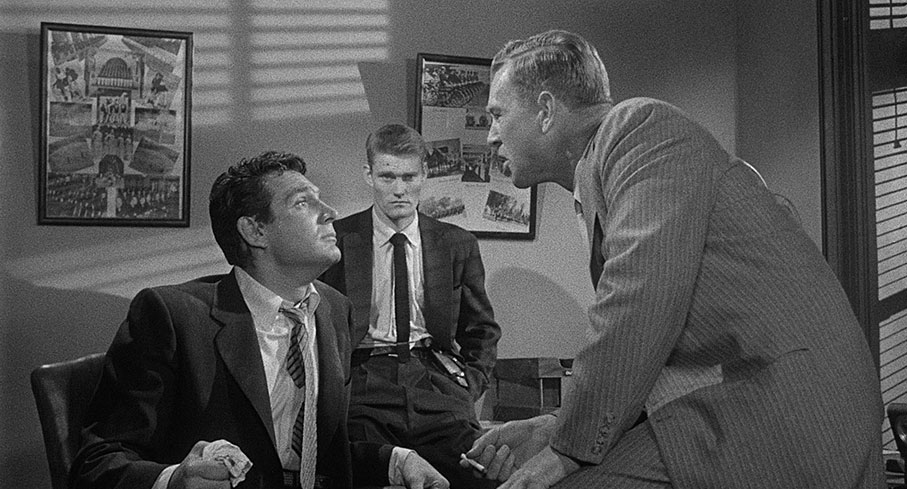
It's at this point I have no real option but to throw up a spoiler warning for what follows, as discussion on any further plot developments – and indeed, one I've tactfully omitted to mention above – will destroy for first-timers the intriguing ambiguity that hangs over this film's first third. Up to this point, it's not clear whether Conroy's instincts are bang on the money and he's being shafted by the system and a convincingly duplicitous Willis, or that Conroy is an obsessive maverick who is so reliant on his gut feelings that he's blinded himself to the fact that he's harassing an innocent man and ignoring all avenues that would lead him to the real killer. It's an uncertainty underlined by having Conroy played by Sterling Hayden, an actor equally adept at portraying figures of authority or ruthless bad guys, and Gene Barry's ability to convince both in his unhinged anger and victimised innocence. So if you're coming to the film for the first time and want to avoid any discussion on what unfolds in the second and third act, hop ahead to the final paragraph of my coverage of this film or click here to do so automatically.
What I omitted to mention above and that seems to further point the finger at Willis is that after he is released, the two other detectives who assaulted him in the interrogation room are blown up by a car bomb (this comes as a real jolt), and the detective who was assigned to tail Willis lost track of him for a crucial couple of hours the previous evening. Yet when approached in his bakery whilst in the process of decorating a cake, Willis has a reasonable explanation for where he was and why he ducked out the back way of a church, and appears to once again have plenty of witnesses. It's when a furious Conway loses his rag and is photographed wrestling with Willis – a picture that makes it to the front page of the following day's newspaper – that he is given the boot. Willis is dropped as a suspect by the Commissioner, but when Conroy and Matthews start rattling him by showing up everywhere he goes and just standing and watching him from a distance, the stressed-out Willis decides to give them the slip and get away for a few days to wind down without being constantly observed. He packs a bag and heads down to a town on the Mexican border, unaware that Matthews has clocked him and reported his trip back to Conroy, who is soon hot on his tail.
It's here that the ambiguity of the first third is brought to a thundering halt, as Willis catches up with his barroom singer girlfriend Marianna (Gloria Grahame), who greets him warmly then protests that he seems to come and go as he pleases, which prompts Willis to slap her sharply in the face, which she responds to by kissing him passionately. Clearly these two have a very different relationship to the homely one Willis has with his wife, whose existence Marianne knows nothing about. Here we see a very different Willis than the one he presents to his family and public up north, the side of his personality that briefly flashed to the surface in the interrogation room and drove him to such extremes of revenge. There's probably a whole essay to be written about how a man as volatile and violent as Willis is here is able to bury this under a mask of public respectability for such long periods at a time, going home each night to his loving family after spending his days making nice cakes for celebratory events at his bakery. I'd love to see how he handles difficult customers.
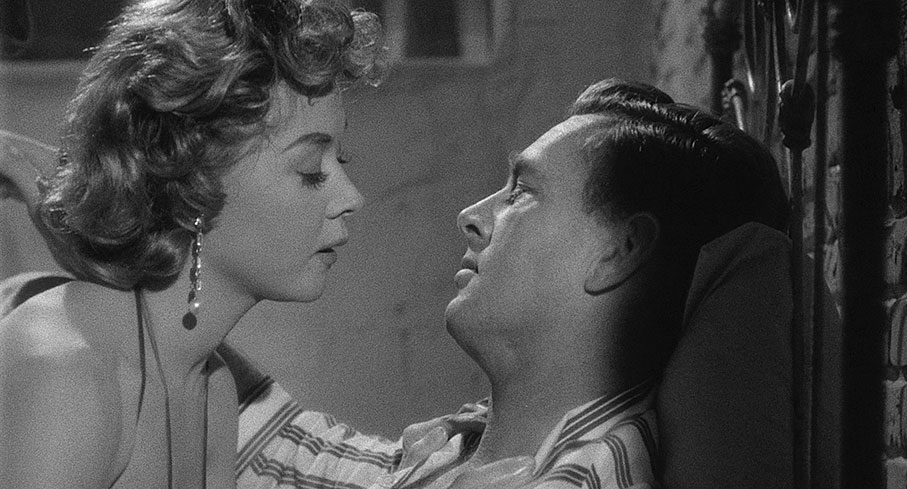
How these three become intertwined relies on the sort of coincidence and chance that movies rely on but happen only once in a blue moon in real life. It also requires us to swallow the notion that a man who has risen through the ranks to the post of Chief of Detectives, and who has been awarded the prestigious Medal of Valor, could be dopey enough to be fooled into following some random dude into a backstreet after he offered to show him where Willis is. When he gets mugged and left for dead by the man's cronies, part of me thought he deserved it for being such a gullible dope. That he's found by a kid he was kind to earlier and ends up being nursed by Marianne because she lives in the same block takes some swallowing, but it does help to build tension over when and how this will inevitably explode, and just who will be hit by the shrapnel.
Once again, Naked Alibi is more a noir-infused crime drama than a full-blown noir, but when the elements kick in, they do so with some style. If there's a moral issue with the setup it's the same one that was to dog the later Dirty Harry (which shares some of Naked Alibi's DNA), that we are asked to ignore a detective's bullying behaviour based on nothing but gut instinct because he's shown to be the only one who recognises this man for what he truly is, a stone-cold killer. But this supposes that he always makes the right call, that he never targets a suspect who turns out not to be guilty of anything but a stroppy attitude, a justification of persecution and violence as a working method based on the one time we know that his actions are justified. But this is the sort of morally questionable ground that is almost de rigueur for noir crime dramas and is unlikely to give many genre fans sleepless nights.
Starting out as police procedural and moving into the noir territory with the location switch, Naked Alibi is a consistently entertaining and intermittently hard-boiled crime drama. A sound script by A Kiss Before Dying screenwriter Lawrence Roman (from a story by J. Robert Bren and Gladys Atwater) is solidly directed by Jerry Hopper and atmospherically photographed by Russell Metty, but ultimately it's the lead players that leave the greatest impression. Sterling Hayden and Gene Barry are both on fine form, but the show is quietly stolen by Gloria Grahame as Marianne. Whether lacing her sensual performance of a song with a whiff of world weary cynicism, casually batting away come-ons from customers, or sexily attempting to seduce the injured Conroy, she dominates very scene she is in. Overall, this is a robust work built around a trio of engaging characters, and for me one of the highlights of this intriguing set.
Part 2: Tech Specs, Special Features and Summary >>
|